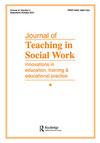加拿大社会工作教育中对等角色扮演的情绪调节:来自医学标准化来访者的贡献
IF 0.9
Q3 EDUCATION & EDUCATIONAL RESEARCH
引用次数: 0
摘要
摘要社会工作教育中的点对点角色扮演在通才社会工作技能的教学中继续被广泛使用。然而,对于许多学生来说,在讨论临床问题时不熟悉角色扮演来访者可能会导致他们在社会工作-来访者接触中情绪失调。为了探索学生在扮演客户角色时保持情绪调节的策略,本研究收集了来自加拿大医学院的标准化客户的观点,他们在客户角色中进行了重复的模拟表演。标准化的客户(N = 116)回应了一个在线,定性调查,探索如何在模拟他们管理自己的情绪。主题分析揭示了以下调节策略:1)内在:a)与角色保持距离,b)沉浸于角色,c)关注情感;2)外部:a)表演,b)自我照顾的重要性。本研究提供社会工作教育工作者协助学生在点对点角色扮演练习中扮演客户的建议。关键词:标准化clientpeer-to-peer role-playsocial工作educationclientemotional监管披露statementNo潜在的利益冲突是报告的作者(年代)。本文章由计算机程序翻译,如有差异,请以英文原文为准。
Emotional Regulation in Peer-To-Peer Role-Play in Canadian Social Work Education: The Contribution from Standardized Clients in Medicine
ABSTRACTPeer-to-peer role-play in social work education continues to have widespread use in the teaching of generalist social work skills. For many students, however, the unfamiliarity of role-playing the client in conjunction with discussing clinical concerns may lead them to become emotionally dysregulated during the social work-client encounter. To explore strategies by which students can maintain emotional regulation when playing the client role, this study garnered the perspectives of Standardized Clients from Canadian medical schools who conduct repeated, simulated performances in the client role. Standardized Clients (N = 116) responded to an online, qualitative survey which explored how they manage their emotions during simulations. Thematic analysis revealed the following regulation strategies: 1) Internal: a) Distance self from the role, b) Immerse in the role, c) Focus on emotions; and 2) External: a) Putting on a performance, and b) The importance of self-care. This paper offers suggestions for social work educators to assist students playing the client in peer-to-peer role-play exercises.KEYWORDS: Standardized clientpeer-to-peer role-playsocial work educationclientemotional regulation Disclosure statementNo potential conflict of interest was reported by the author(s).
求助全文
通过发布文献求助,成功后即可免费获取论文全文。
去求助
来源期刊

Journal of Teaching in Social Work
EDUCATION & EDUCATIONAL RESEARCH-
CiteScore
1.20
自引率
0.00%
发文量
36
期刊介绍:
The Journal of Teaching in Social Work fills a long-standing gap in the social work literature by providing opportunities for creative and able teachers—in schools, agency-based training programs, and direct practice—to share with their colleagues what experience and systematic study has taught them about successful teaching. Through articles focusing on the teacher, the teaching process, and new contexts of teaching, the journal is an essential forum for teaching and learning processes and the factors affecting their quality. The journal recognizes that all social work practitioners who wish to teach (whatever their specialty) should know the philosophies of teaching and learning as well as educational methods and techniques.
 求助内容:
求助内容: 应助结果提醒方式:
应助结果提醒方式:


